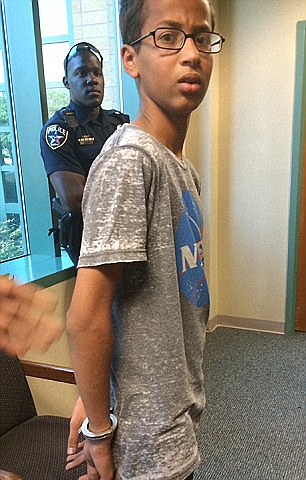A fourteen-year-old boy brought a homemade clock to school and hours later the Texas teen was accused of creating a hoax bomb and arrested on sight. After a brief investigation, no charges were filed and the case was closed, but it is far from being over. Naturally, much of the Muslim-American community expressed concerns and several non-Muslims extended support to Ahmed, including Facebook creator Mark Zuckerberg, Presidential candidate Hillary Clinton and President Barack Obama.
As a middle and high school student, I learned hardly anything about Islam or the Middle East as a whole. Growing up in the post-9/11 era, I was exposed to countless media stories portraying Islam in a negative light, painting all Muslims with the same, large brush. Luckily, I was raised to believe that every person is equal despite any kind of difference and to not believe everything I’m told. I managed to go through adolescence with a very limited knowledge of Islam but an inexplicable yet subtle negative subconscious.
Unfortunately, the things that popular media has been teaching Americans about Islam have created extremely negative stereotypes that have plagued both Americans and Muslims, and of course Muslim-Americans. The broad generalizations used by newscasters, headlines and other outlets cause one radical Muslim or organization to represent over 1.6 billion people across different nations and cultures, sects and beliefs. We have never used the KKK to represent Christians or Americans but somehow we do the same for a marginalized population that we simply do not know much about. Time and time again, media outlets choose to use words and phrases such as “Muslim countries” carelessly, causing both confusion and oversimplification. This is coupled with the constant use of alarming language to discuss anything having to do with Islam in the news, carelessly and incorrectly using words such as “terrorism” and “jihad,” causing an innate association between Islam and threat.
This use of polarizing discourse creates an “us” vs. “them” rhetoric. Such events are decontextualized, and Islam is named as the reason for such actions, instead of the political or personal motives behind a particular event. The issue here does not simply lie in who is right or wrong, but rather in recognizing and understanding the severity that popular media has on reinforcing harmful stereotypes and broad generalizations. Ahmed’s name and skin color inarguably contributed to his teacher’s’ decision to call the police and assuming his invention may be a bomb, likely drawing from this negative discourse surrounding Arabs and Muslims.
While it is important to recognize President Obama’s effort in reaching out to Ahmed and making it clear that this was a mistake, this country’s Islamophobia and structural racism do not seed from our current leader but are ingrained in nearly every aspect of our society and continue to live on because of how they’ve been institutionalized. It is our responsibility to continue to combat these negative, harmful and false ideologies in order to give all Americans the rights reserved to them in the constitution, regardless of their religion, ethnic background, gender and sexuality.
